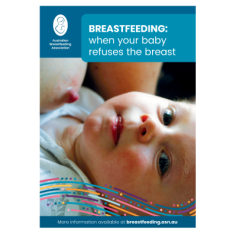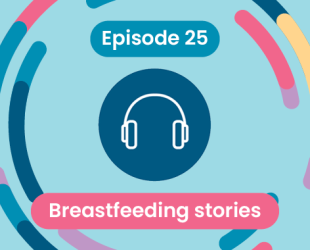Gentle, practical tips to encourage feeding and help you both feel calmer.

When your baby doesn’t want to feed it can be distressing and confusing. You might be looking for reasons and wondering whether you’re doing something wrong. Many mums experience this and while it can certainly be stressful, it’s usually a temporary phase.
There are lots of reasons why a baby might not want to feed. Sometimes it’s linked to your baby’s stage of development or health, but often, there’s no clear cause. If you’d like to explore possible reasons, you can read more in our article Why won’t my baby feed?
Or, read on for gentle tips to encourage your baby to feed, no matter what the cause.
Help your baby get the milk
Sometimes babies refuse the breast if the milk isn’t flowing quickly. You could:
Try relaxation and other techniques to help your let-down reflex.
Hold your baby skin to skin. Oxytocin is released which calms you both, encourages baby to take the breast and helps milk flow.
Use gentle breast compressions once your baby is feeding, to help your milk flow faster.
If your baby has been used to the instant and fast flow from a bottle, try paced bottled feeding any expressed milk (or formula) feeds or offer milk in a cup instead.
Express a little milk into your baby's mouth to remind them what the breast is for.
Try a different time or place:
- Look for times when your baby is more likely to feed, like just after waking up or when they’re feeling sleepy.
- Offer the breast as soon as you notice your baby’s hunger cues.
- Try breastfeeding after a bath, when your baby is warm and relaxed (if your baby enjoys baths).
- Feeding while you’re both in the bath can help some babies. Make sure you have someone to help you lift your baby in and out safely.
- Spend time playing with your baby on the floor while you’re bare from the waist up. After a while, gently offer your breast.
Remove distractions
- Feed in a quiet, dim room or a private space.
- Give your baby a soft toy or wear a baby-safe necklace to help them focus.
- Put away your phone or turn off the TV.
Help your baby relax:
- Carry and gently rock your baby, or take them outside for fresh air.
- Sing softly or play calming music.
- Sometimes a partner or support person can help calm your baby away from the breast.
Try a different feeding position:
- If your baby is still newborn, use a laid-back position and hold them on your chest, skin to skin. In time, their feeding instincts will encourage them to seek the breast.
- Try other positions: under your arm (twin style), lying down next to each other, or cuddled close.
- Walk around with your baby upright, with their head level with your nipple. Use a sling if it helps.
A few more tips:
- Limit bottles if you can, to encourage your baby to suck at the breast.
- Soothe your baby with a clean finger or dummy, then gently offer the breast.
- If your baby is very hungry, start with a little expressed milk, then offer the breast.
- Some mums use a nipple shield at the start of a feed, then slip it off once the milk is flowing. Read more about nipple shields.
Try to stay calm
When your baby is fussy or refusing to feed, it’s completely normal to feel upset or frustrated. Try to be gentle with yourself and your baby. If you’re both feeling on edge, taking a few deep breaths, like you might have done during labour or when meditating, can settle your body and mind. Steadier breathing can help you both feel calmer.
You might find it helpful to focus on relaxing your body, play some soothing music, gently rock your baby, or hold them skin-to-skin. This relaxation can help your milk flow more easily, so your baby will get milk once they latch on.
If your baby is very unsettled, cross, or crying, or if you’re feeling angry or upset, it’s okay to take a break. Try again when you’re both feeling calmer. In the meantime, a cuddle or a game might distract your baby, or a walk outside could help you both relax. This can also be a good time to ask your partner, a friend, or a relative to step in and give you both a break.
When nothing seems to work
Sometimes, even after trying everything, your baby still refuses the breast. This can feel heartbreaking. Please remember, you’re doing your best, and your feelings are valid. Breast refusal is usually temporary, and sometimes you may never know the reason. You don’t have to go through this alone. ABAbreastfeeding counsellors are here to listen and support you, whatever your situation.
© Australian Breastfeeding Association January 2026
Read more about breast refusal




